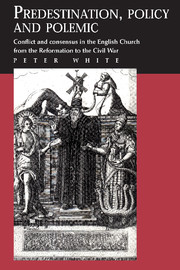 Predestination, Policy and Polemic
Predestination, Policy and Polemic Book contents
- Frontmatter
- Contents
- Preface
- Acknowledgements
- 1 The polemics of predestination: William Prynne and Peter Heylyn
- 2 The theology of predestination: Beza and Arminius
- 3 Early English Protestantism
- 4 The Elizabethan church settlement
- 5 Elizabeth's church: the limits of consensus
- 6 The Cambridge controversies of the 1590s
- 7 Richard Hooker
- 8 The early Jacobean church
- 9 The Synod of Dort
- 10 Policy and polemic, 1619–1623
- 11 A gag for the Gospel? Richard Montagu and Protestant orthodoxy
- 12 Arminianism and the court, 1625–1629
- 13 Thomas Jackson
- 14 Neile and Laud on predestination
- 15 The personal rule, 1629–1640
- Select bibliography
- Index
10 - Policy and polemic, 1619–1623
Published online by Cambridge University Press: 11 September 2009
- Frontmatter
- Contents
- Preface
- Acknowledgements
- 1 The polemics of predestination: William Prynne and Peter Heylyn
- 2 The theology of predestination: Beza and Arminius
- 3 Early English Protestantism
- 4 The Elizabethan church settlement
- 5 Elizabeth's church: the limits of consensus
- 6 The Cambridge controversies of the 1590s
- 7 Richard Hooker
- 8 The early Jacobean church
- 9 The Synod of Dort
- 10 Policy and polemic, 1619–1623
- 11 A gag for the Gospel? Richard Montagu and Protestant orthodoxy
- 12 Arminianism and the court, 1625–1629
- 13 Thomas Jackson
- 14 Neile and Laud on predestination
- 15 The personal rule, 1629–1640
- Select bibliography
- Index
Summary
The decade after 1619 is commonly seen as a decisive watershed in the doctrinal evolution of the Church of England. Just as the Synod of Dort, with which it began, is taken as confirmation and summit of the allegiance of that church to international Calvinism, so the Declaration prefixed to the Thirty-nine Articles, which marked its end, is regarded as the final step by which that same Calvinism was effectively outlawed. In the years between, the publication of the controversial works of Richard Montagu and the failure to condemn them at the York House Conference, coupled with the episcopal changes of 1626–8 and above all the appointment of Montagu himself to the see of Chichester are taken to be the major steps whereby a previously dominant Calvinist theology was replaced by Arminianism and its hierarchy swamped by adherents of the new doctrine. This was the decade, in short, which saw ‘the rise of English Arminianism’.
That picture, it will be argued, is conceptually flawed and at odds with much of the evidence, which demands a much more subtle colouring than any simplistic ‘Calvinist’ and ‘Arminian’ polarity is capable of accommodating. While it will not be denied that there was at one stage strong support for the Remonstrants, hitherto unused evidence will be adduced to show that it antedated rather than followed the appearance of the New Gagg. An attempt will be made to relate it to other developments, ecclesiastical and political, that were more or less coincident with it. The evolution of Richard Montagu's theology will thereafter be reviewed, and its orientation in its contemporary setting assessed; it will be suggested that the concerns of Durham House were substantially independent of support for the Remonstrants in the English Church.
- Type
- Chapter
- Information
- Predestination, Policy and PolemicConflict and Consensus in the English Church from the Reformation to the Civil War, pp. 203 - 214Publisher: Cambridge University PressPrint publication year: 1992
